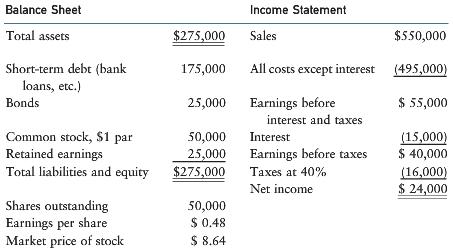The Cox Computer Company has grown rapidly during the past five years. Recently, its commercial bank urged
Question:
The Cox Computer Company has grown rapidly during the past five years. Recently, its commercial bank urged the company to consider increasing its permanent financing. Its bank loan has risen to $150,000 and carries a 10 percent interest rate, and Cox has been 30 to 60 days late in paying its suppliers.
Discussions with an investment banker have resulted in the decision to raise $250,000 at this time. Investment bankers have assured Cox that the following alternatives are feasible (issuing costs will be ignored):
• Alternative 1—Sell common stock at $10 per share.
• Alternative 2—Sell convertible bonds with a 10 percent coupon, convertible into 80 shares of common stock for each $1,000 bond (i.e., the conversion price is $12.50 per share).
• Alternative 3—Sell debentures with a 12 percent coupon; each bond will sell at its face value of $1,000 and will have a maturity of 10 years.
Charles Cox, the president, owns 80 percent of Cox’s common stock and wishes to maintain control of the company; 50,000 shares are outstanding. The following are summaries of Cox’s latest financial statements:

a. Show the new balance sheet under each alternative. For Alternative 2, show the balance sheet after conversion of the bond into stock. Assume that $150,000 of the funds raised will be used to pay off the bank loan and the rest will be used to increase total assets.
b. Show Charles Cox’s control position under each alternative, assuming that he does not purchase additional shares.
c. What is the effect on earnings per share of each alternative if it is assumed that earnings before interest and taxes will be 20 percent of total assets?
d. Which of the three alternatives would you recommend to Charles Cox, and why?
DebenturesDebenture DefinitionDebentures are corporate loan instruments secured against the promise by the issuer to pay interest and principal. The holder of the debenture is promised to be paid a periodic interest and principal at the term. Companies who... Face Value
Face value is a financial term used to describe the nominal or dollar value of a security, as stated by its issuer. For stocks, the face value is the original cost of the stock, as listed on the certificate. For bonds, it is the amount paid to the... Maturity
Maturity is the date on which the life of a transaction or financial instrument ends, after which it must either be renewed, or it will cease to exist. The term is commonly used for deposits, foreign exchange spot, and forward transactions, interest...
Step by Step Answer:






